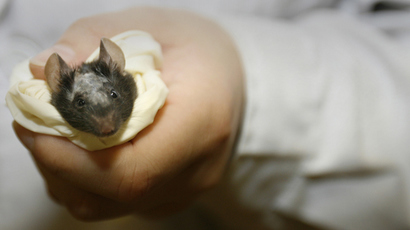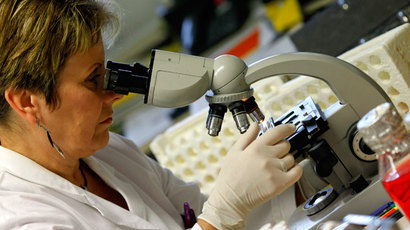US ponders testing 3-person fertilization technique on humans

Federal health regulators have been arguing the pros and cons of a controversial new fertilization method that would see babies created from the DNA of three people in an attempt to avoid possible genetic diseases.
A two-day hearing on the issue, initiated by the Food and Drug
Administration (FDA), has been prompted by a successful testing
of the technique on animals at the Oregon Health & Science
University in Portland.
Group of researches, headed by Dr. Shoukhrat Mitalipov, used the
method of DNA replacement to produce five healthy monkeys. Now
the scientists say they are ready to test it on an initial sample
of women at risk of passing on with genetic health conditions to
their children, including blindness, diabetes, heart failure and
epilepsy.
"We want to replace these mutated genes, which by nature have
become pathogenic to humans," said Dr. Shoukhrat Mitalipov,
AP reported. "We're reversing them back to normal, so I don't
understand why you would be opposing that."
The opposition to the experiment has been strong, however.
Critics argue that genetically modified embryos are unethical as
they could be a step toward “designer babies,” meaning some
parents would be willing to not just get rid of a defective
trait, but customize their child’s appearance or intelligence.
At this stage, however, the FDA panel is examining technical,
rather than ethical issues regarding the procedure. A number of
experts argued that there’s still not enough evidence on the
safety of the so-called “three-person fertilization” technique.
"The end of the experiment will come decades later,"
said Michigan State University's Keith Latham. "It's going to
take us that long to figure out the health of the progeny
produced from these procedures."
An estimated 1 in 4,000 US children inherit diseases due to
mutations in mitochondrial DNA, which is only passed along by the
mother. This type of DNA is located outside the nucleus of the
cell, where the bulk of the traits-shaping genes are.
The technique, tested by Mitalipov, presupposes taking a healthy
female donor egg and replacing its nucleus DNA with that of the
baby’s mother, thus leaving behind her unhealthy mitochondrial
DNA. The researcher argues it is only “gene correction”,
not “gene modification”, since all of the major traits
of the baby are in the nucleus, which stays intact.
On Wednesday, the FDA group is going to discuss the details of
potential gene replacement in humans. So far, the first day of
the FDA hearing shows that the US scientific community is still
wary about testing the procedure on humans.
“There’s overall great concern for the well-being of these kids,” Evan Y. Snyder, the panel’s chairman, said as cited by the Washington Post. “I think there was a sense of the committee that at this particular point in time, there was probably not enough data either in animals or in vitro to conclusively move on to human trials . . . without answering a few additional questions.”
In more than 40 countries human genetic modifications that can be inherited are currently illegal.
The UK, however, has been considering softening its approach. It was drafting regulations last year which would allow the creation of human embryos using genetic material from three parents. The final version of the bill is expected to be debated and a voted in parliament this year.














